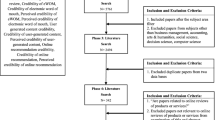Abstract
This article describes empirical research results regarding the “history effect” in software quality evaluation processes. Most software quality models and evaluation processes models assume that software quality may be deterministically evaluated, especially when it is evaluated by experts. Consequently, software developers focus on the technical characteristics of the software product. A similar assumption is common in most engineering disciplines. However, in regard to other kinds of goods, direct violations of the assumption about objective evaluation were shown to be affected by the consequences of cognitive processes limitations. Ongoing discussion in the area of behavioral economics raises the question: are the experts prone to observation biases? If they are, then software quality models overlook an important aspect of software quality evaluation. This article proposes an experiment that aims to trace the influence of users’ knowledge on software quality assessment. Measuring the influence of single variables for the software quality perception process is a complex task. There is no valid quality model for the precise measurement of product quality, and consequently software engineering does not have tools to freely manipulate the quality level for a product. This article proposes a simplified method to manipulate the observed quality level, thereby making it possible to conduct research. The proposed experiment has been conducted among professional software evaluators. The results show the significant negative influence (large effect size) of negative experience of users on final opinion about software quality regardless of its actual level.





Similar content being viewed by others
Notes
Latin—with other things being the same
The list is based on Software Product Quality in Use as in ISO/IEC 25010 Commission Draft, 2009
References
Abramowicz W, Hofman R, Suryn W, Zyskowski D (2008) SQuaRE based web services quality model. International Conference on Internet Computing and Web Services. International Association of Engineers, Hong Kong
Akerlof G (1970) The market for ‘lemons’: quality uncertainty and the market mechanism. Q J Econ (84)
Baron R, Vandello J, Brunsman B (1996) The forgotten variable in conformity research: Impact of task importance on social influence. J Pers Soc Psychol 71(5)
Basili V (1993) The experimental paradigm in software engineering. In Rombach D, Basili V, Selby R (eds) Lecture notes in computer software. Springer-Verlag
Basili V (2007) The role of controlled experiments in software engineering research. In: Basili V (ed) Empirical software engineering issues. Springer-Verlag, Berlin
Becker G (1968) Crime and punishment: an economic approach. J Polit Econ
Boehm B, Brown J, Lipow M, MacCleod G (1978) Characteristics of software quality. American Elsevier, New York
Brookshire D, Coursey D (1987) Measuring the value of a public good: an empirical comparison of elicitation procedures. Am Econ Rev 77(4)
Camerer C, Hogarth R (1999) The effects of financial incentives in experiments: a review and capital-labor-production framework. J Risk Uncertain 19
Camerer C, Loewenstein G (2003) Behavioral economics: past, present, future (introduction for advances in behavioral economics). Carnegie Mellon University, Mimeo
Cohen J (1988) Statistical power analysis for the behavioral sciences, 2nd edn. Erlbaum, Hillsdale
Hofman R (2010) Software quality perception. In Khaled Elleithy (ed) Advanced techniques in computing sciences and software engineering. Springer 2010, ISBN: 978-90-481-3659-9
Kahneman D, Tversky A (1979) “Prospect” theory: an analysis of decision under risk. Econometrica (47)
Levitt S, List J (2008) Field experiments in economics: the past, the present, and the future. National Bureau of Economic Research Working Paper Series, Cambridge
List A (2004) Neoclassical theory versus prospect theory: evidence from the marketplace. Econometrica (72)
McCall J, Richards P, Walters G (1977) Factors In software quality. Griffiths Air Force Base, NY, Rome Air Development Center Air Force Systems Command
Miguel P, daSilva M, Chiosini E, Schützer K (2007) Assessment of service quality dimensions: a study in a vehicle repair service chain. POMS College of Service Operations and EurOMA Conference New Challenges in Service Operations, London
Mook D (1983) In defense of external invalidity. Am Psychol (38)
Nęcka E, Orzechowski J, Szymura B (2008) Psychologia poznawcza. Wydawnictwo Naukowe PWN, Warszawa
Nobel Foundation. (n.d.). Nobelprize.org. Retrieved 07 27, 2009, from All Laureates in Economics: http://nobelprize.org/nobel_prizes/economics/laureates/
Osgood C, Suci G, Tannenbaum P (1957) The measurement of meaning. University of Illinois Press, Urbana
Pressman R (1992) Software engineering. A practitioner’s approach. McGraw Hill
Shaughnessy J, Zechmeister E, Zechmeister J (2005) Research methods in psychology (7th edn). McGraw-Hill
Simon H (1956) Rational choice and structure of environments. Psychol rev (63)
Smith A (1776) An inquiry into the nature and causes of the wealth of nations
Stavrinoudis D, Xenos M, Peppas P, Christodoulakis D (2005) Early estimation of users’ perception of software quality. Softw Qual J 13
Steenkamp JEBM, Wierenga B, Meulenberg MTG (1986) Kwaliteitsperceptie van Voedingsmiddelen deel 1, SWOKA, onderzoeksrapport 40-2, Den Haag
Suryn W, Abran A (2003) ISO/IEC SQuaRE. The seconod generation of standards for software product quality. IASTED2003
Tversky A, Kahneman D (1982) Judgement under uncertainty: heuristics and biases. In: Kahneman D, Tversky A, Slovic P (eds) Judgement under uncertainty: heuristics and biases. Cambridge University Press, Cambridge
Tversky A, Kahneman D (1974) Judgment under uncertainty: heuristics and biases. Science (185)
Underwood B, Shaughnessy J (1975) Experimentation in psychology. Wiley, New York
Xenos M, Christodoulakis D (1995) Software quality: the user’s point of view. In Lee M, Barta B, Juliff P (eds) Software quality and productivity: theory, practice, education and training. Chapman and Hall
Zelenski J (2007) The role of personality in emotion, judgment and decision making. In Vohs K, Baumeister R, Loewenstein G, Do Emotions Help or Hurt Decision Making?. Russell Sage Foundation
Author information
Authors and Affiliations
Corresponding author
Additional information
Editor: Martin Shepperd
Rights and permissions
About this article
Cite this article
Hofman, R. Behavioral economics in software quality engineering. Empir Software Eng 16, 278–293 (2011). https://doi.org/10.1007/s10664-010-9140-x
Published:
Issue Date:
DOI: https://doi.org/10.1007/s10664-010-9140-x




